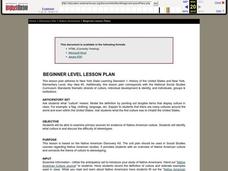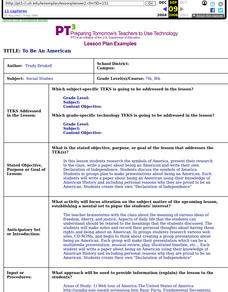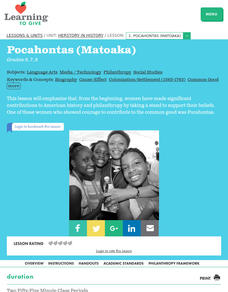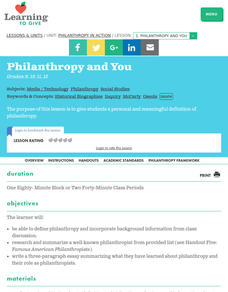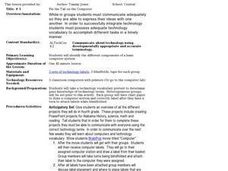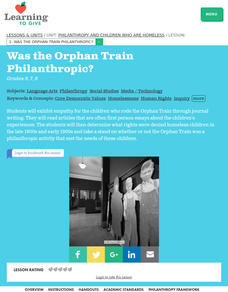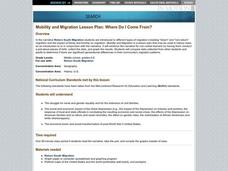Curated OER
Native Americans
Students are be able to examine primary sources for evidence of Native American culture. They identify what culture is and discuss the difficulty of stereotypes. Students are given examples of different cultures.
Curated OER
Civil War
Learners are be able to analyze primary sources (Civil War images) for examples of how soldiers are portrayed historically. They discuss what a hero is and why some individuals are heroes to certain groups while others are not.
Curated OER
For the Well-being of Our Citizens Lesson 2: Poverty And Human Rights
Students investigate the definitions of poverty and impoverishment. They design a poster that show the Articles of the Universal Declaration of Human Rights that are violated by poverty. They write an article for the school newspaper...
Curated OER
Do You Haiku?
After examining several Haiku and noting characteristics of the form, class members create five of their own poems. Use this resource for extra practice or review.
Curated OER
The Teachings of His Holiness The Dalai Lama
Sixth graders study the teachings of the Dalai Lama. They read and discuss speeches given by the Dalai Lama. Students examine, read and analyze specific quotes from the Dalai Lama.
Curated OER
Manifest Destiny, Louisiana Purchase, and Lewis and Clark
Students discuss famous explorers. They discuss manifest destiny and watch a PowerPoint presentation. Students relate the explorers trips to a trip to Mars. They create a graphic organizer showing what they would bring on a trip to Mars....
Curated OER
Japan
Students locate Japan's absolute and relative location on a globe and various maps. They describe Japan's various regions and islands and their system of education, customs and religion. They assess Japan's impact on our society.
Curated OER
To Be An American
Students research the symbols of America, present their research to the class, write a paper about being an American and write their own Declaration of Independence.
Curated OER
Interactive Time Line from 1620-1621 with the Pilgrims and the Wampanoag Indians
Pupils view pictures of pilgrims and Indians and describe the differences between them after Internet research; students then create a time line representing an event through drawings.
Curated OER
British Colonization-Settling the Thirteen Colonies (1607-1733)
Learners study the thirteen colonies: geography, economics, politics, and religious groups. They explore early colonial life, and create a travel brochure, travel guide of the 13 Colonies, and word search.
Curated OER
Pocahontas (Matoaka)
Students explain how Pocahontas contributed to the people of Jamestown. They relate her actions to the core democratic values. They also infer about the effect of her actions.
Curated OER
Digging Up Facts About Dinosaurs
Second graders conduct research on a given dinosaur using various resources, complete an information sheet that be used to create their graphic organizer from, and produce a graphic organizer, using the Kidspiration software.
Curated OER
Bridges for All Lesson 1: Fighting Chance (1850-1877)
Students study how a Quaker woman, Laura Smith Haviland, served as a lifeline for fugitive and freedmen during the American Civil War era. They research other philanthropic organizations and the associate vocabulary of this era.
Curated OER
Philanthropy and You
Pupils define and discuss philanthropy. They research a philanthropist and write a three-paragraph essay summarizing what they have learned , including their own roles as philanthropists. They also plan and initiate personal acts of...
Curated OER
Technology and the Great Depression
Students examine how technology affected the Great Depression era. They view a video, conduct Internet research, and write articles for a class technology magazine.
Curated OER
Pin the Tail on the Computer
Students identify the basic components of the computer system. They watch a Brain Pop movie about computers and then draw a "vocabulary label" from a basket. The student is blindfolded and sticks the label on a picture of a computer....
Curated OER
The Vikings
Students research and explore Viking culture, distinguishing between fact and fiction, and examine their contribution to our society.
Curated OER
Athabaskan Migration & Bering Strait
Students study Athabaskan migration patterns and the Bering Strait Land Bridge theory. They investigate the importance of the expansion of trade and compare the differences between American Indian oral tradition accounts of origin and...
Curated OER
Philanthropy And Children Who Are Homeless Lesson 2: Was the Orphan Train Philanthropic?
Young scholars study the lives of homeless children who rode the Orphan Train by reading first person essays of the children's experiences. They examine what rights were denied to the homeless children during the late 1800's and decide...
Curated OER
The Final Word
Middle schoolers research biographies of Americans who advanced science. They create an obituary for the person to share what information they have gathered. They discuss the importance of the obituary as the "final word" of a person to...
Curated OER
Racism and the Box
Students examine racism and how it relates to self-deception. They identify the effect of racism on society. They reflect on the lesson plan by writing a paragraph about discrimination and racism.
Curated OER
WHERE DO I COME FROM?
Learners analyze the struggle for racial and gender equality and for the extension of civil liberties, the social and economic impact of the Great Depression, and the economic boom and social transformation of post-World War II United...
Curated OER
The Underground Railroad
Third graders explore two different websites about the Underground Railroad. They make a graphic organizer to categorize the reasons a person might have for and against helping slaves escape on the Underground Railroad. They incorporate...
Curated OER
Lewis Hine
Students are be able to analyze primary sources (photographs) of immigration during the early 1900s at Ellis Island. They are be able to identify why immigrants came to America.


